#Chinese Mythology
Text
One nerd's musing about Chinese religion and "respect"
-I try to stay away from fandom discourse, but, much like how you can smell the stench from a dumpster fire without walking into said dumpster fire, I've noticed something that seemed to come up a lot in western JTTW + adjacent fandoms: "respect Chinese religion".
-Usually as a reason for why you shouldn't ship a character, because of fucking course it's shipping discourse too.
-And my first reaction is "Man, you are taking Chinese religion too darn seriously, more than people who are born and raised in China."
-My second reaction is "I mean, most of us are atheist/agnostic by default anyways, with a good number of what I'd call 'atheist/agnostics with superstitions': people who said they were not religious, yet believed in Fengshui or divinations and burnt incense at temples for good luck."
-My third reaction: "But why do I get the feeling that when you mention 'Respect', you are thinking about something completely different?"
-Then I reread an essay from Anthony C. Yu, "Religion and Literature in China: The "Obscure Way" of Journey to the West", and the metaphorical lightbulb just lit up over my head.
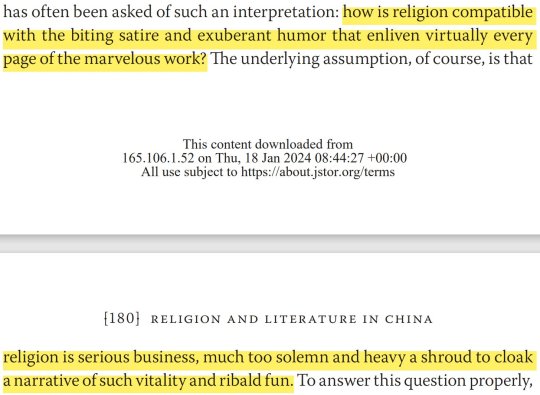

(Everything below applies more to Daoism + associated folk religions, but by the time most classic Chinese vernacular novels were written, the blending of the three religions had become well and truly mainstream.)
(The conception of gods differs from dynasty to dynasty. What I'm describing here is mostly based on Ming and Qing ones; if you went back to Han or pre-Qin times, most of these would not apply.)
(I am one of the "atheist/agnostic by default" people. I just have an interest in this kind of stuff. I am also just one Chinese person, and an actual Daoist/Buddhist/Religion Studies researcher would probably have a lot more valuable information and perspective to offer when it comes to contemporary practices and worship. Like any people on the internet: take my words with a grain of salt.)
-Even in the past, when society was far less secularized, Chinese gods are not omniscient, perfect beings whose worship is a solemn, humorless affair. Some's worship are Serious Business, but that has more to do with the sort of gods they are and the patronage they enjoy, not godhood in and of itself.
-And even the ones that you are supposed to "treat seriously" are still very human. To use an analogy I've used plenty of times before: you respect and fear them in the same way you'd respect and fear an emperor's official, or the emperor himself, because if you don't, you are not gonna like the consequences.
-However, unlike Jesus, the emperor & his officials were capable of being temperamental, flawed, or an outright asshole, divine or not. Ideally, they wouldn't be, and if you were one of the "serious" believers——people who actually got an official permit, became ordained clergy, and went to live in a temple, you were unlikely to think of your gods in that manner.
-But it wasn't a complete, utter impossibility. The lower you go in the pantheon, the closer you get to popular religion, the less "serious" the gods and their worship become. By that, I mean general attitude, not sincerity of faith. You still shouldn't be rude to them, but, well, they are more likely to take a joke in stride, or participate in the "vulgar" pleasures of commoners because they weren't as bound to Confucian moral standards or religious disciplines.
-To stretch the same analogy further: you should still respect your village head, they could still give your ass a good spanking for being a disrespectful brat, but you were not obligated to get on your knees and kowtow to them like you would do in front of a provincial magistrate, the emperor's minister, or the emperor himself, nor did they have the power to chop your head off just because you were rude.
-On the other hand, the emperor would never visit a random peasant just to help them fix their broken plow or treat them to a nice meal, but your village head could, and your relationship would probably be warmer and a lot more personal as a result.
-Your respect for them was more likely to stem from the things they actually did for you and the village as a whole, instead of something owed to this distant, powerful authority you might never get to see in your lifetime, but could change its course with a single stroke of a brush.
-Now exchange "village head" for your run-of-the-mill Tudis and Chenghuangs and friendly neighborhood spirits (because yes, people worshipped yaoguais for the exact same reasons), emperor + his officials for the Celestial Bureaucracy, and you'd have a basic idea of how Chinese religions worked on the ground level.
-This is far from absolute: maybe your village head was a spiteful old bastard who loved bullying his juniors, maybe your regional magistrate was an honest, upright man who could enjoy a good drink and a good laugh, maybe the emperor was a lenient one and wouldn't chop your head off for petty offenses. But their general degree of power over you and the closeness of your relationships still apply.
-Complicating the matter further, some folk gods (like Wutong) were worshipped not because they brought blessings, but because they were the divine equivalent of gangsters running a protection racket: you basically bribed them with offerings so they'd leave you alone and not wreck your shit. Famous people who died violently and were posthumously deified often fell into this category——shockingly enough, Guan Yu used to be one such god!
-Yeah, kinda like how your average guy could become an official through the imperial examinations, so could humans become gods through posthumous worship, or cultivate themselves into immortals and Enlightened beings.
-Some immortals aren't qualified for, or interested in a position in the Celestial Bureaucracy——they are the equivalent of your hermits, your cloistered Daoist priests, your common literati who kept trying and failing the exams. But some do get a job offer and gladly take it.
-Anyways, back to my original point: that's why it's so absurd when people pull the "Respect Chinese Religion1!!1!" card and immediately follow up with "Would you do X to Jesus?"
-Um, there are a lot of things you can do with Chinese gods that I'm pretty sure you can't do with Jesus. Like worshipping him side by side with Buddha and Confucius (Lao Tzu). Or inviting him to possess you and drink copious amount of alcohol (Tang-ki mediums in SEA). Or genderbend him into a woman over the course of several centuries because folks just like that version of Jesus better (Guan Yin/Avalokitesvara).
-But most importantly, Chinese religions are kinda a "free market" where you could pick and choose between gods, based on their vicinity to you and how efficient they were at answering prayers. You respect them because they'll help you out, you aren't an asshole and know your manners, and pissing them off is a bad idea in general, not because they are some omnipotent, perfect beings who demand exclusive and total reverence.
-A lot of the worship was also, well, very "practical" and almost transactional in nature: leave offerings to Great Immortal Hu, and he doesn't steal your imperial seal while you aren't looking. Perform the rites right and meditate on a Thunder General's visage, and you can temporarily channel said deity's power. Get this talisman for your kids at Bixia Yuanjun's temple, and they'll be protected from smallpox.
-"Faith alone" or "Scripture alone" is seldom the reason people worship popular deities. Even the obsession with afterlife wasn't about the eternal destination of your soul, and more about reducing the potential duration of the prison sentence for you and your loved ones so you can move on faster and reincarnate into a better life.
-Also, there isn't a single "canon" of scriptures. Many popular gods don't show up in Daoist literature until much later. Daoist scriptures often came up with their own gigantic pantheons, full of gods no one had heard of prior to said book, or enjoyed no worship in temples whatsoever.
-In the same way famous dead people could become gods via worship, famous fictional characters could, too, become gods of folk religion——FSYY's pantheon was very influential on popular worship, but that doesn't mean you should take the novels as actual scriptures.
-Like, God-Demon novels are to orthodox Daoism/Buddhism what the Divine Comedy is to medieval Christian doctrines, except no priests had actually built a Church of Saint Beatrice, while Daoists did put FSYY characters into their temples. By their very nature, the worship that stemmed from these books is not on the same level of "seriousness" as, say, the Tiantai school of Buddhism and their veneration of the Lotus Sutra.
-At the risk of being guilty of the same insertion of Abrahamic religion where it doesn't belong: You don't cite Dante's Inferno in a theological debate, nor would any self-respecting pastor preach it to churchgoers on a Sunday.
-Similarly, you don't use JTTW or FSYY as your sole evidence for why something is "disrespectful to Chinese religion/tradition" when many practitioners of said religions won't treat them as anything more than fantasy novels.
-In fact, let's use Tripitaka as an example. The historical Xuanzang was an extraordinarily talented, faithful, and determined monk. In JTTW, he was a caricature of a Confucian scholar in a Buddhist kasaya and served the same narrative function as Princess Peach in a Mario game.
-Does the presence of satire alone make JTTW anti-Buddhist, or its religious allegories less poignant? I'd say no. Should you take it as seriously as actual Buddhist sutras, when the book didn't even take itself 100% seriously? Also no.
-To expand further on the idea of "seriousness": even outside of vernacular novels, practitioners are not beholden to a universal set of strict religious laws and taboos.
-Both Daoism and Buddhism had what we called "cloistered" and "non-cloistered" adherents; only the former needed to follow their religious laws and (usually) took a vow of celibacy.
-Certain paths of Daoist cultivation allow for alcohol and sexual activities (thanks @ruibaozha for the info), and some immortals, like Lv Dongbin, had a well-established "playboy" reputation in folklore.
-Though it was rarer for Buddhism and very misunderstood, esoteric variants of it did utilize sexual imageries and sex. And, again, most of the above would not apply if you weren't among the cloistered and ordained clergy.
-Furthermore, not even the worship of gods is mandatory! You could just be a Daoist who was really into internal alchemy, cultivating your body and mind in order to prolong your lifespan and, ideally, attain immortality.
-This idea of "respect" as…for a lack of better words, No Fun & R18 Stuff Allowed, you must treat all divinity with fearful reverence and put yourself completely at their mercy, is NOT the norm in Chinese religious traditions.
-There are different degrees and types of respect, and not every god is supposed to be treated like the Supreme Heavenly Emperor himself during an imperial ceremony; the gods are capable of cracking a joke, and so are we!
TL;DR: Religions are complicated, and you aren't respecting Chinese religions by acting like a stereotypical Puritan over popular Chinese deities and their fictional portrayals.
#chinese religion#chinese mythology#chinese folklore#fandom discourse#journey to the west#xiyouji#investiture of the gods#fengshen yanyi
73 notes
·
View notes
Note
How would you imagine Monkey King reuniting with Lin after 500 years if she possibly was made immortal when she merged with Bhudda?
Well....
I sorta suggested the idea that Lin might be an incarnation of the Golden Cicada in an older Wukongverse post.
But perhaps I was thinking a little too small.
Perhaps instead of her being the Golden Cicada, she's in fact a major missing entity?
Someone known for granting the Monkey King mercy?


For we know... she's the life Miao Shan, the one who eventually became Guanyin in her (second) death. Hence why the Books of the Dead end her entry abruptly.
Wukong busts out after those 500 years are up, sees the Bodhisattva of Mercy and is immediately like "YOOOOO!!! YOU BECAME A GOD!? I'm so proud of you pebble!!" while his new pilgrim buddies have no idea what tf is going on.
22 notes
·
View notes
Text

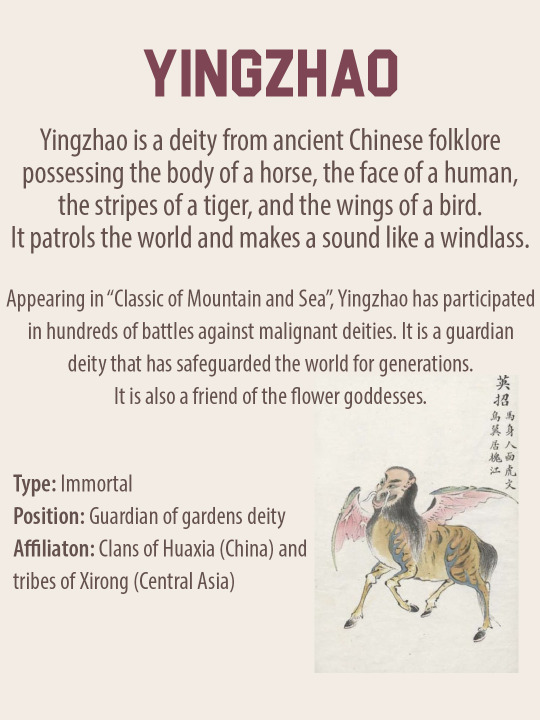
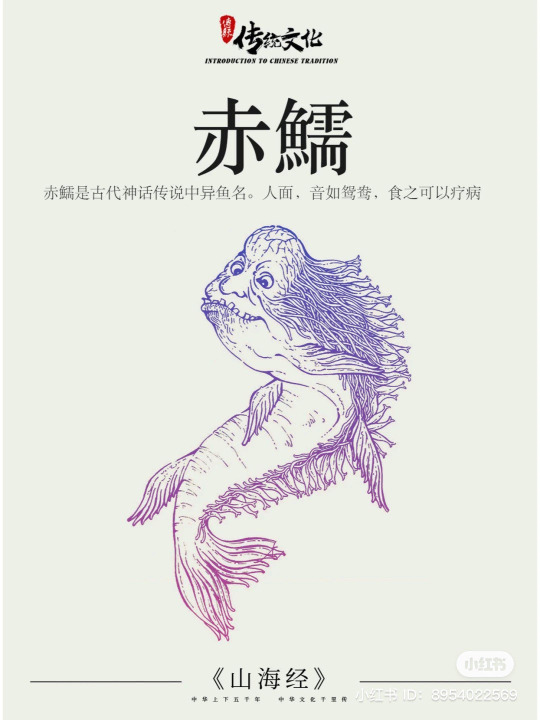

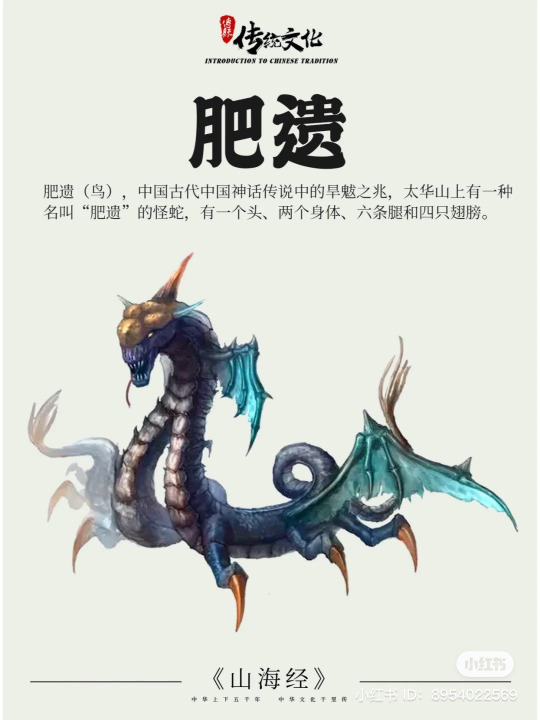

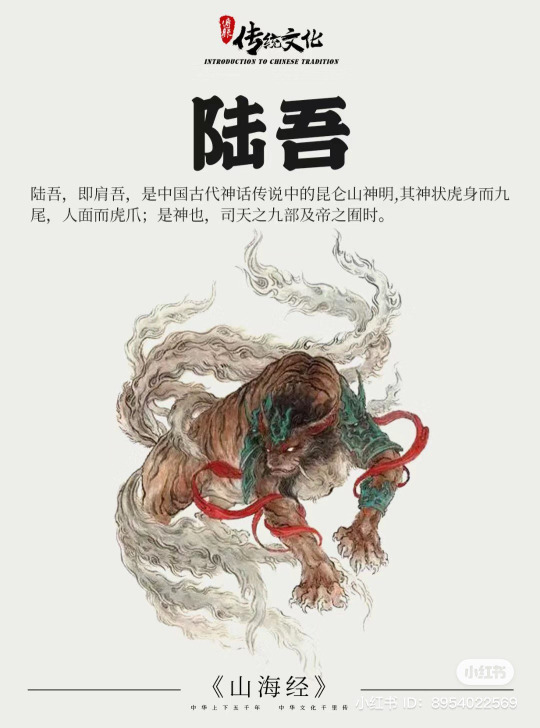
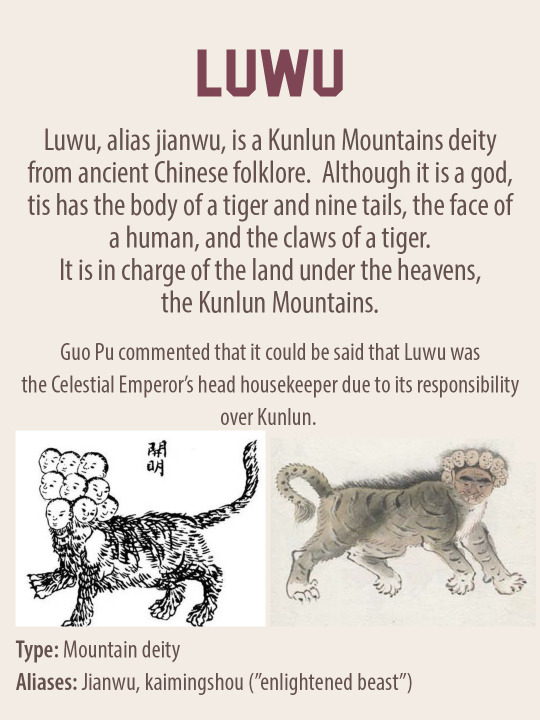
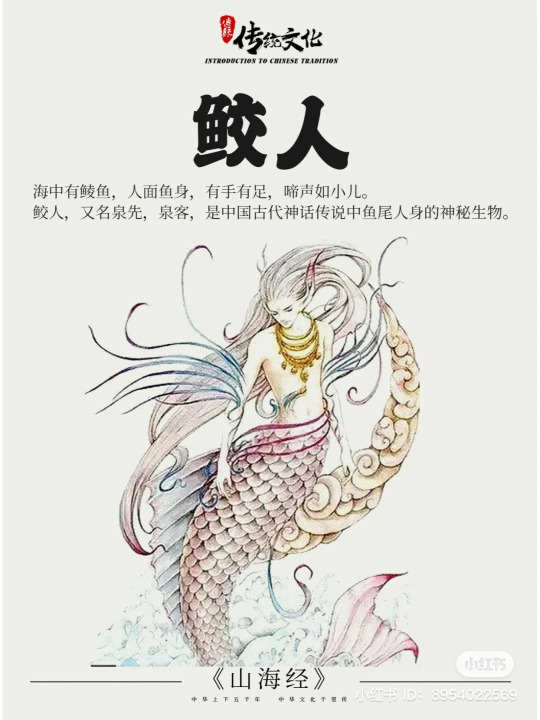

A look at a few mythological beings from 山海经, Classic of Mountain and Sea, compiled beginning around 500 BC with the earliest remaining finished version existing by 200 BC.
Right column graphics created by me, translating the left and adding a few more details.
#chinese folklore#arts#chinese mythology#text#kind of different from what i normally do i guess!#chinese history#mine#if you see any typos in this no you don't bc i didn't either
2K notes
·
View notes
Text
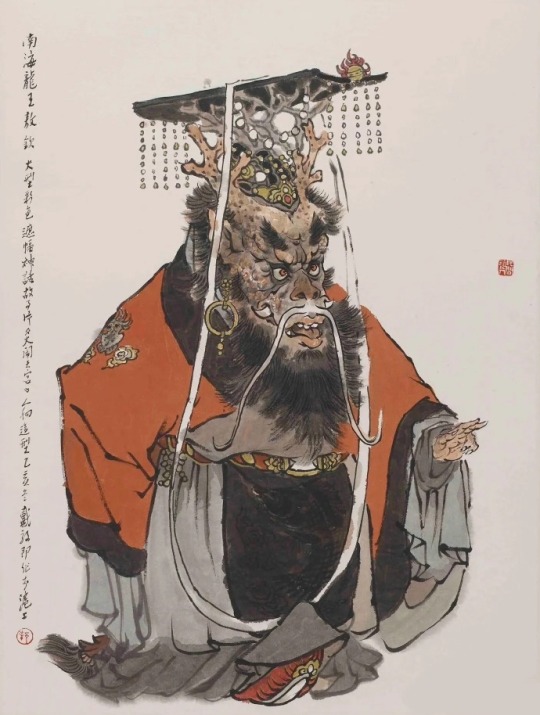
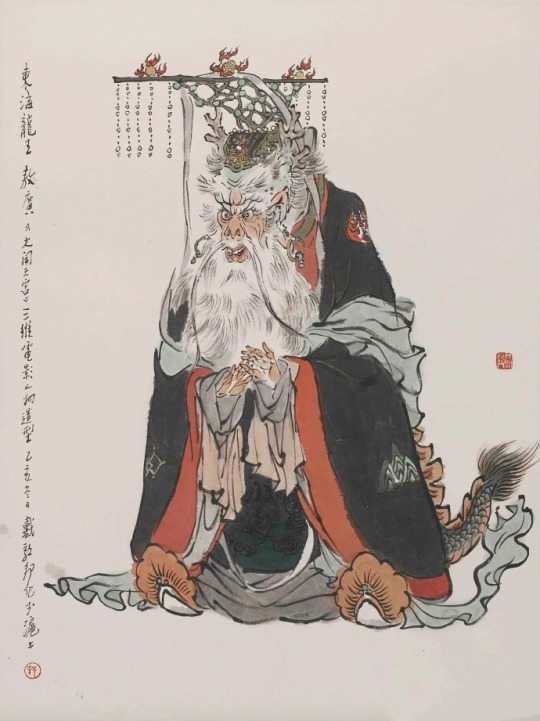
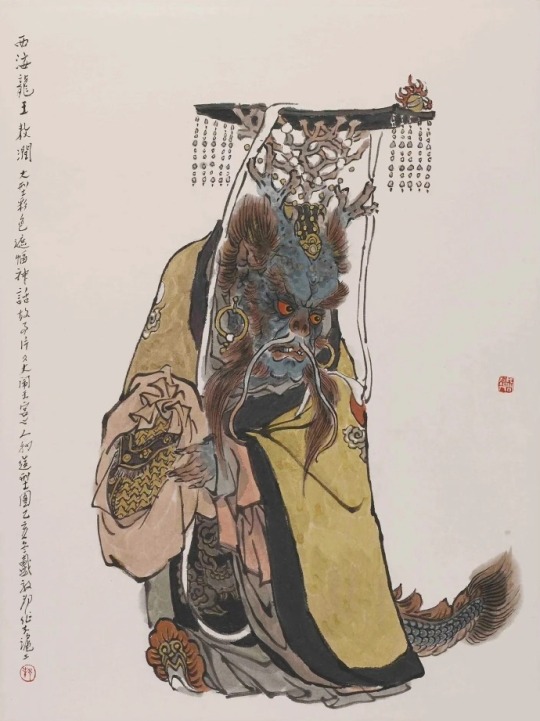
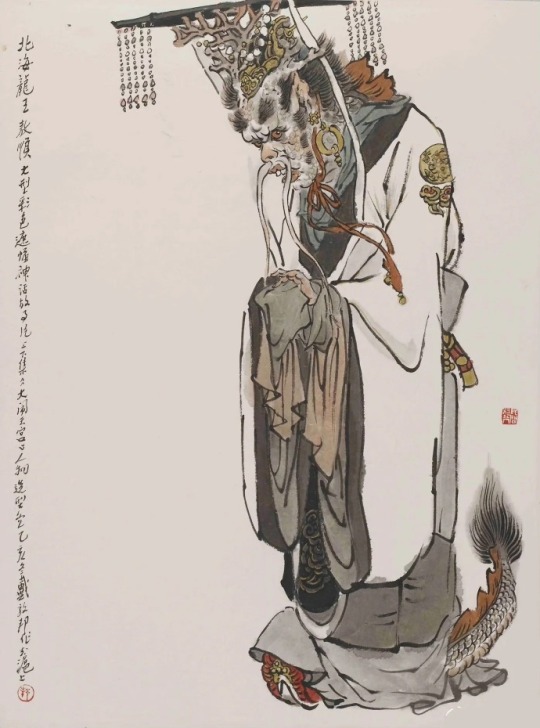
Dragon Kings of the Four Seas
Renowned Shanghai painter’s Dai Dunbang (戴敦邦) 20th century illustration for the Chinese Ming dynasty classic “Journey to the West” (《西遊記》) attributed to Wu Cheng'en (吳承恩).
#chinese art#ancient china#chinese culture#chinese painting#chinese calligraphy#chinese ink#ink painting#watercolor#dragon#dragon art#mythical creatures#chinese mythology#mythological creatures#journey to the west#chinese literature#dragon king#Dai Dunbang#西遊記
763 notes
·
View notes
Photo



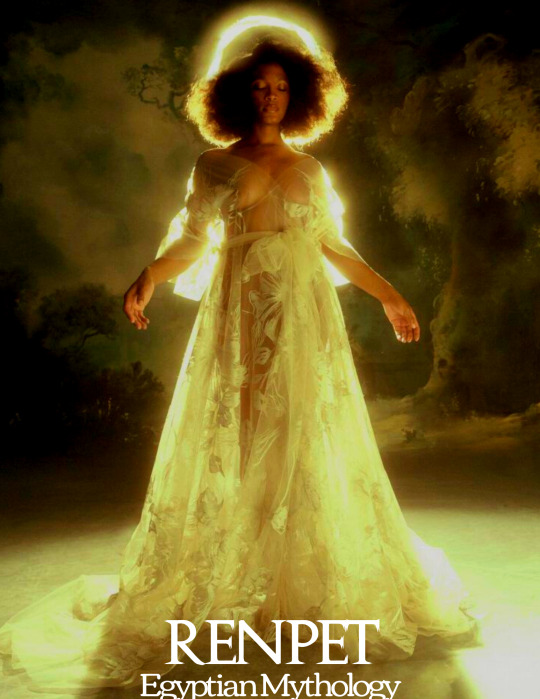
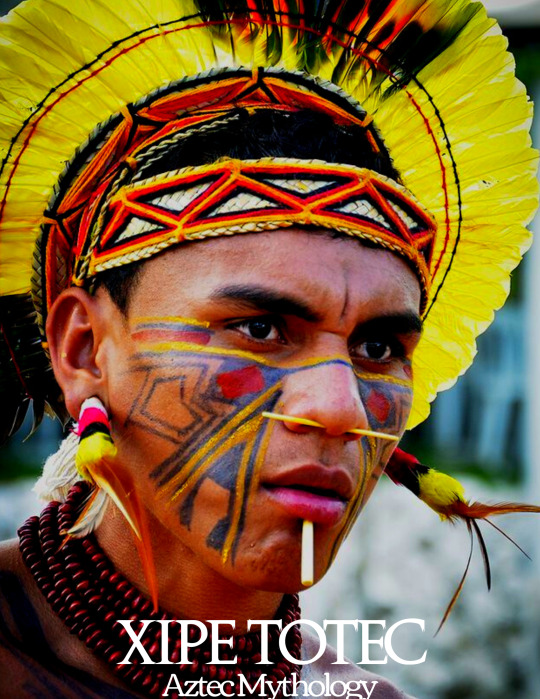
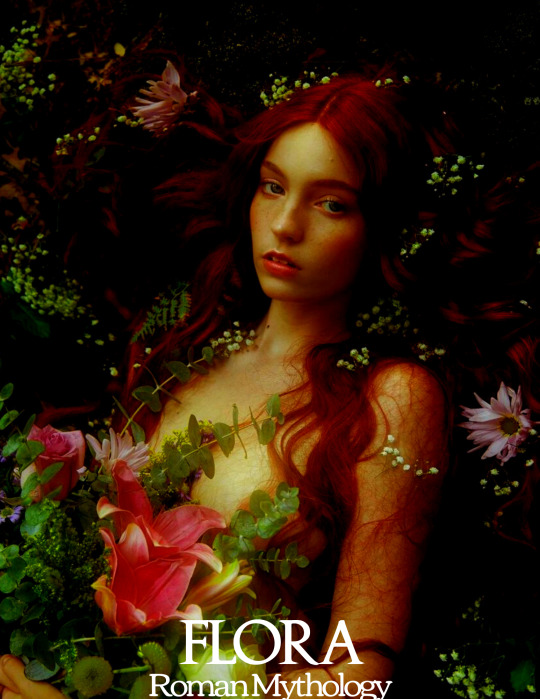
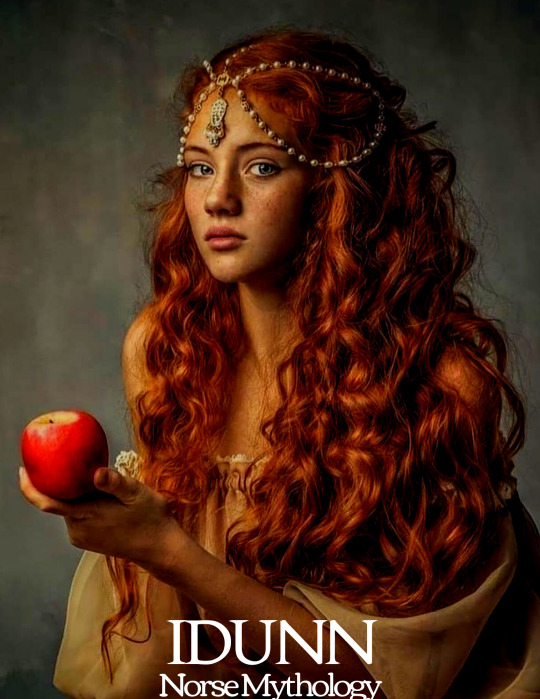
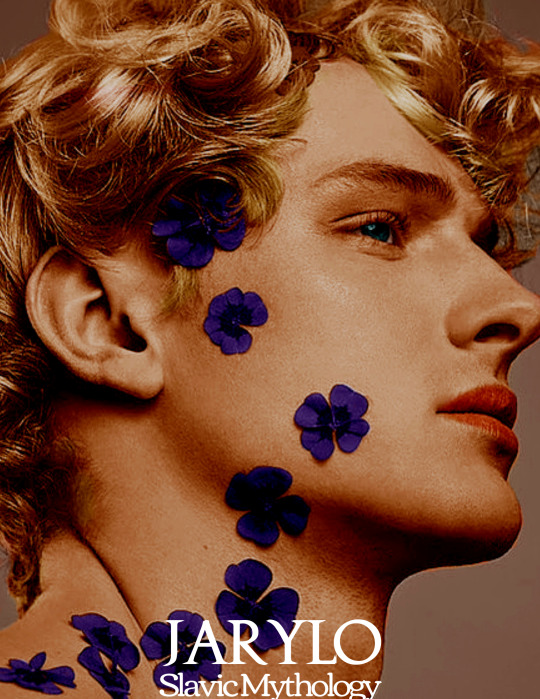
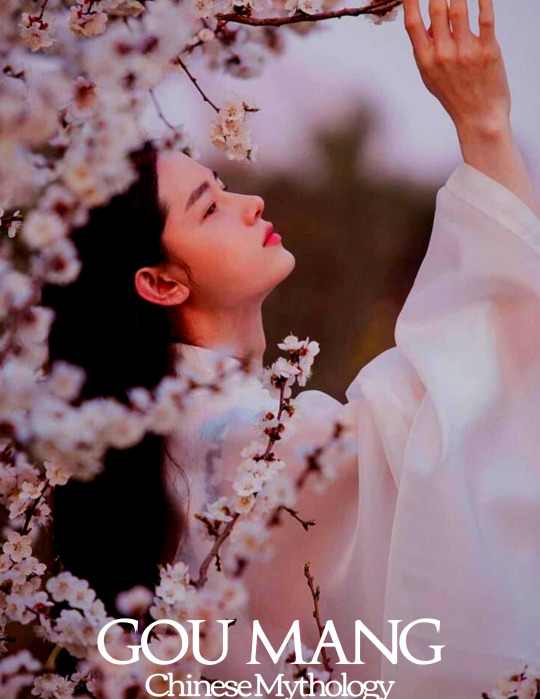

mythologies: spring deities
#greek mythology#persephone#eostre#germanic mythology#blodeuwedd#welsh mythology#renpet#egyptian mythology#xipe totec#aztec mythology#flora#roman mythology#idunn#norse mythology#jarylo#slavic mythology#gou mang#chinese mythology#belenus#cetic mythology#mythologyedit#mythedit#gods#goddesses#sorry if i missed any couldn't fit them
2K notes
·
View notes
Text

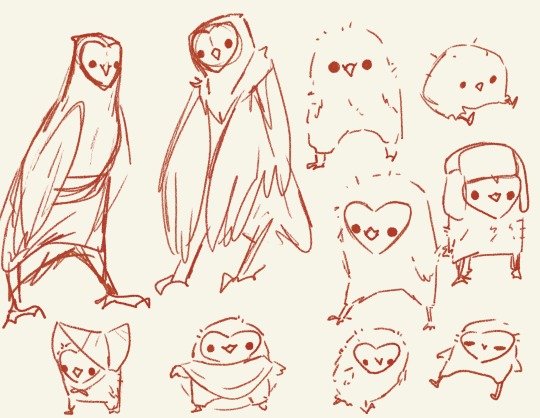
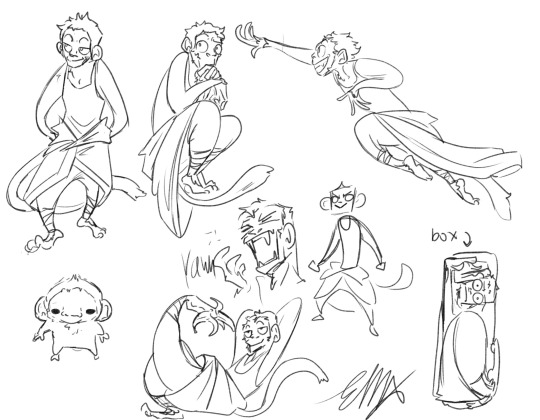
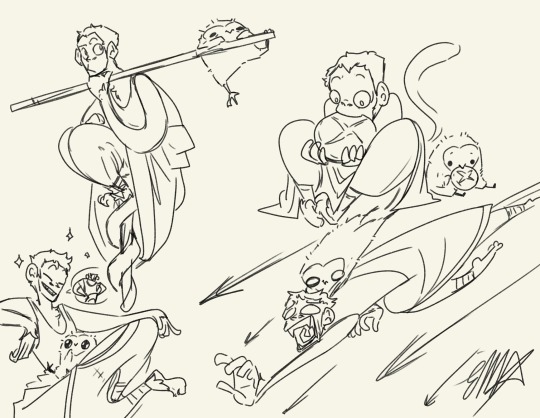
Intermediate Character design class project: animals
It’s just the monkey king
#digital art#drawing#illustration#fanart#artists on tumblr#fantasy#art#web comic#monkey#monkey king#son wukong#journey to the west#chinese mythology#oc#chinese literature#owl#barn owl#owlet
260 notes
·
View notes
Text

Something a bit different than what I normally do, but I hope you all still like it.
I was inspired by the ornate tapestries of the Medieval period, one of favorites being “The caged unicorn” So this is my very subtle homage to it.
#the caged unicorn#unicorn#qilin#kirin#concept art#creature design#bestiary#magic the gathering#dungeons and dragons#digital art#dragon#fantasy#fantasy art#drakes#mythological creatures#medieval#medievalart#asia#japanese mythology#chinese mythology
580 notes
·
View notes
Text

the lady of the moon 🐇🌙
--
This piece is now available on my shop! Link to Listing
419 notes
·
View notes
Text
[Hanfu · 漢服]Chinese immortal Hanfu <西王母/Queen Mother of the West> Based On Yuan Dynasty Taoist Temple Mural<永乐宫/Yongle Palace>
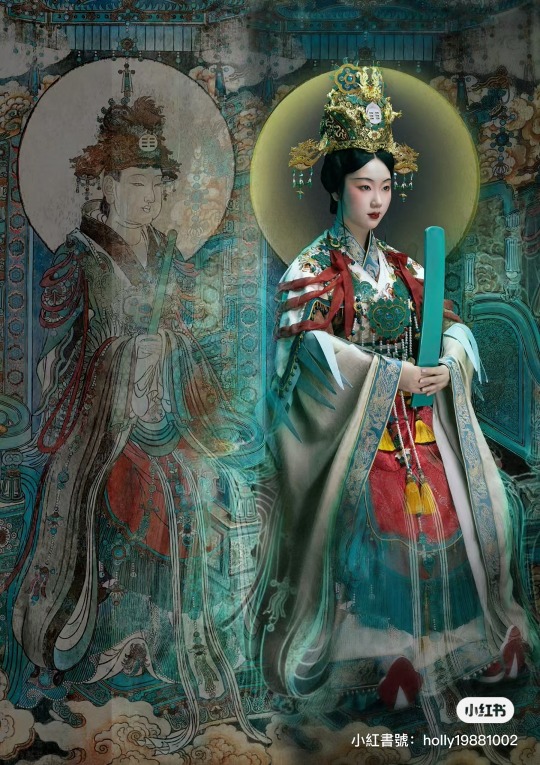
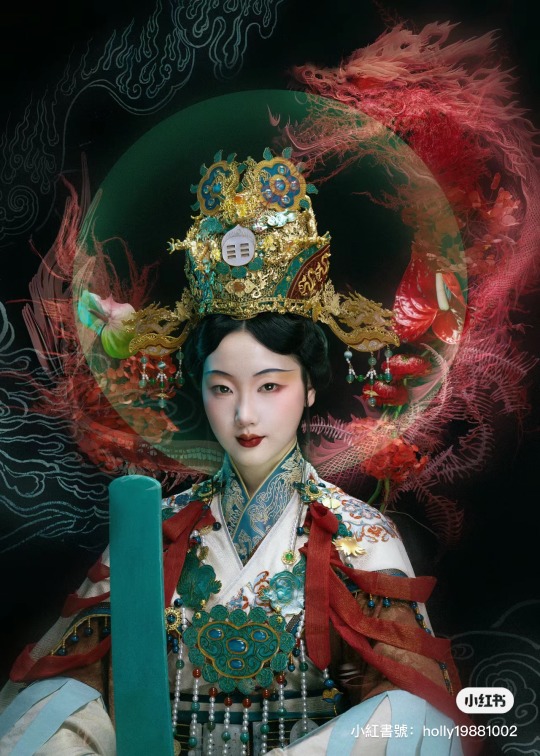
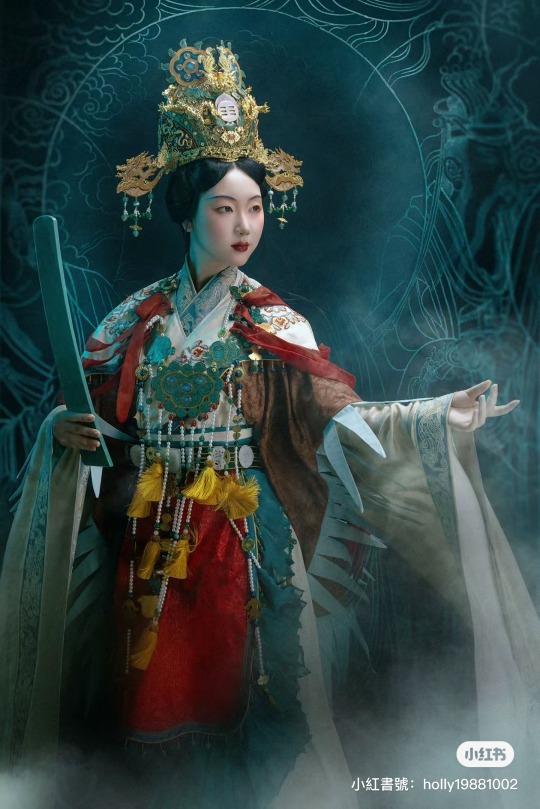
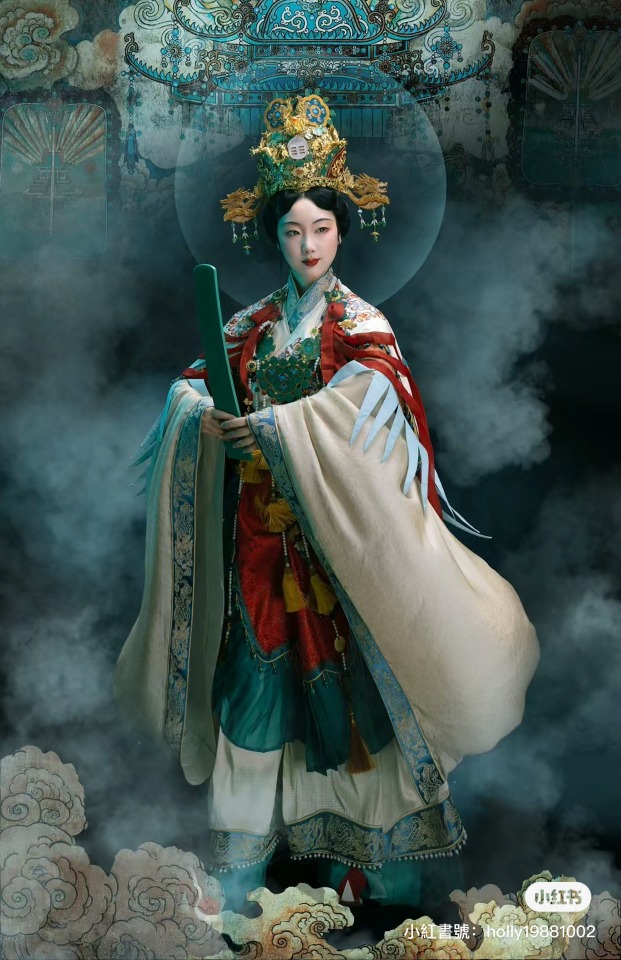
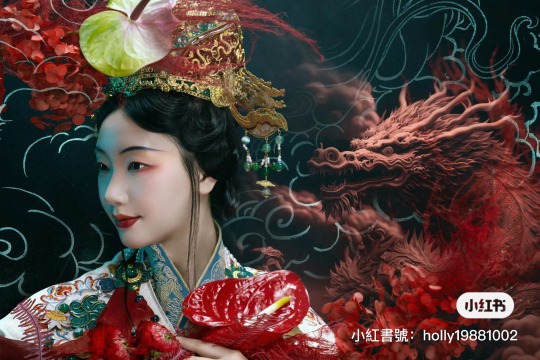
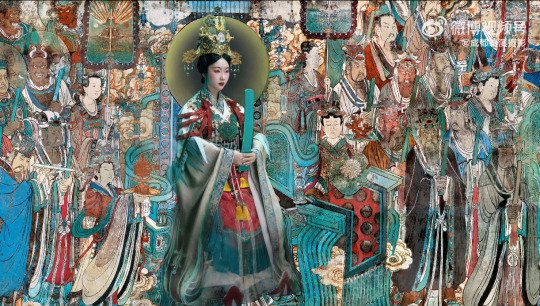
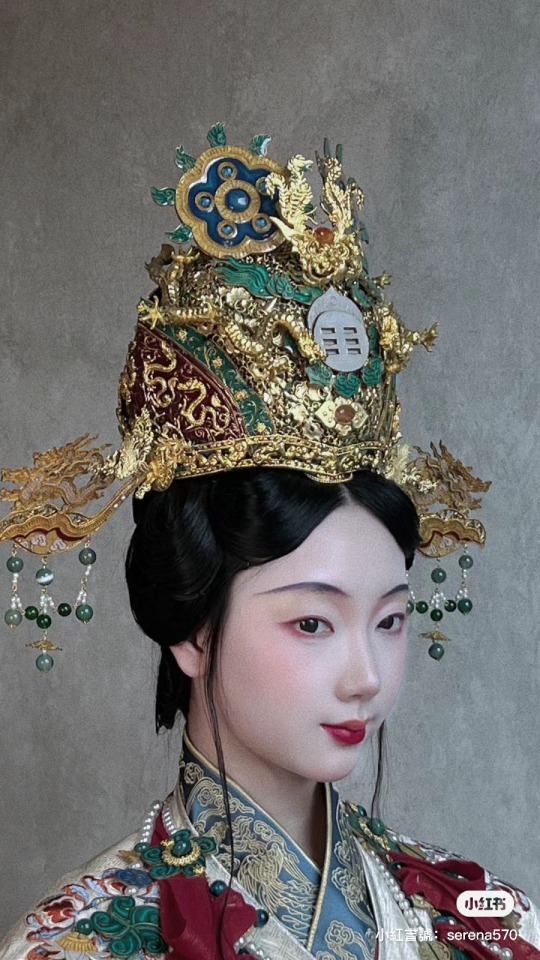
【Historical Artifacts Reference 】:
▶ China Yuan Dynasty Taoist Temple 永乐宫/Yongle Palace Mural
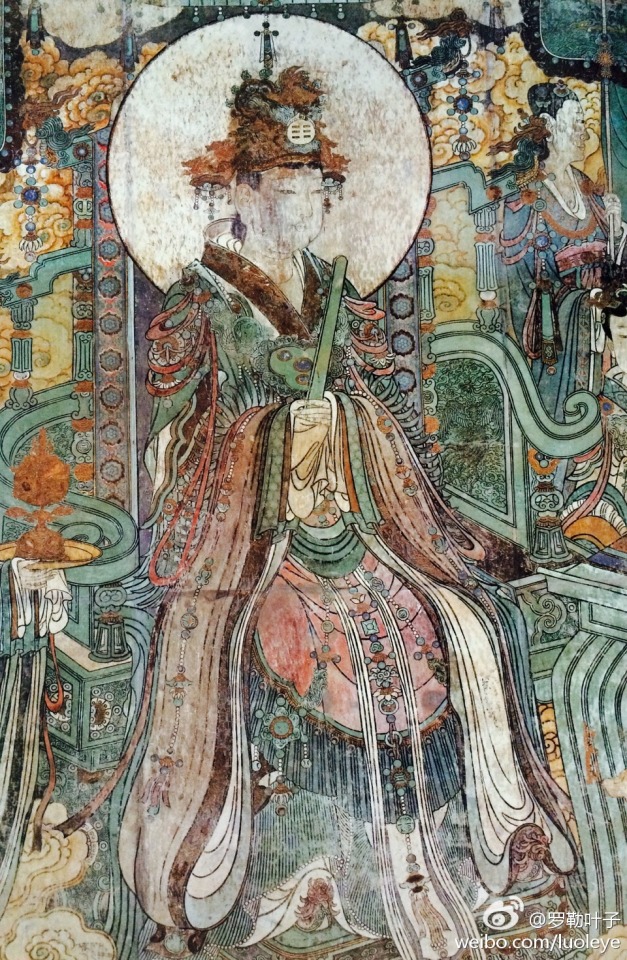
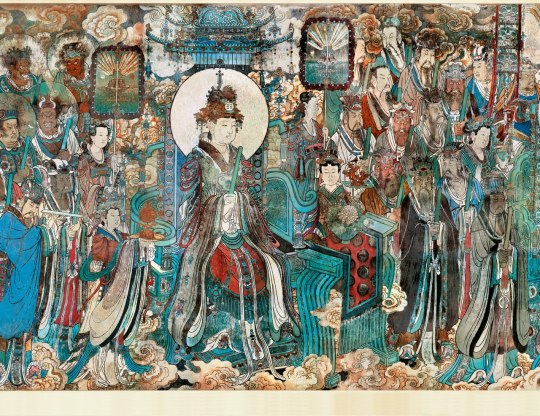
<西王母/Queen Mother of the West>
The Queen Mother of the West, known by various local names, is a mother goddess in Chinese religion and mythology, also worshipped in neighbouring Asian countries, and attested from ancient times.
The first mentions of the Queen Mother date back to the oracle bone inscriptions of the Shang dynasty (1766 – 1122 BCE).
One inscription reads:
Crack-making on day IX (9th day), we divined. If we make offering to the eastern mother and the western mother, there will be approval.
Western Mother refers to an archaic divinity residing in the west. The exact nature of the Mother divinities in the Shang dynasty is unclear, but they were seen as powerful forces deserving of ritual by the people of the Shang dynasty.
Originally, from the earliest known depictions of her in accounts like the Classic of Mountains and Seas during the Zhou dynasty, she was a ferocious goddess of death with the teeth of a tiger, who rules over wild beasts and sends down heavenly punishments such as pestilences. She was also mentioned as an authority ruling over other divinities such as Jiutian Xuannü, a goddess of war and sex.
Other stories hold that she is a mountain goddess or a divine tigress. She is also popularly thought to have blessed the Eight Immortals with their supernatural abilities.
After her integration into the Taoist pantheon, she gradually took on associations with other aspects, such as immortality, as well.
The Queen Mother of the West is most often depicted holding court within her palace on the mythological Mount Kunlun, usually supposed to be in western China (a modern Mount Kunlun is named after this). Her palace is believed to be a perfect and complete paradise, where it was used as a meeting place for the deities and a cosmic pillar where communications between deities and humans were possible.At her palace she was surrounded by a female retinue of prominent goddesses and spiritual attendants. One of her symbols is the Big Dipper.
Although not definite there are many beliefs that her garden had a special orchard of longevity peaches which would ripen once every three thousand years,others believe though that her court on Mount Kunlun was nearby to the orchard of the Peaches of Immortality. No matter where the peaches were located, the Queen Mother of the West is widely known for serving peaches to her guests, which would then make them immortal. She normally wears a distinctive headdress with the Peaches of Immortality suspended from it.
Flourishing parasols, we reach the chronograms' extremity;
Riding on the mist, I wander to Lofty Whirlwind Peak.
The Lady of the Supreme Primordial descends through jade interior doors;
The Queen Mother opens her Blue-gem Palace.
Celestial people—What a Crowd!
A lofty meeting inside the Cyan Audience Hall.
Arrayed Attendants perform Cloud Songs;
Realized intonations fill the Grand Empty Space.
Every thousand years, her purple crabapple ripens;
Every four kalpas, her numinous melon produces abundantly.
This music differs from that at the feast in the wilderness—
So convivial, and certainly infinite.— Wu Yun (Complete Tang Poems 1967, line 4942)
One of the earliest written references to the Queen Mother comes from the writings of the Taoist writer Zhuangzi (c. 4th century BCE):
The Queen Mother of the West obtained it [the Dao]... ...and took up her seat at Shao kuang. No one knows her beginning; no one knows her end.
Zhuangzi describes the Queen Mother as one of the highest of the deities, meaning she had gained immortality and celestial powers. Zhuangzi also states that Xiwangmu is seated upon a spiritual western mountain range, suggesting she is connected to not only the heavens, but also to the west.
Legendary encounters
In Tu Kuang-ting's text, he includes narrative accounts of the Queen Mother's encounters with legendary Chinese heroes. One such account narrates an encounter between the Queen Mother and Laozi (Lord Lao):
"In the 25th year of King Chao of the Chou dynasty (1028 BCE) …"
"…Lord Lao and the realized person Yin Hsi went traveling…"
"…on their behalf, the Queen Mother of the West explicated the Scripture of Constant Purity and Quiet."
In this account, the Queen Mother plays the role of Laozi's superior and is credited with the ultimate authorship of the Dao De Jing. This dichotomy of the Queen Mother as the superior is a characteristic of Shangqing Taoism, a goddess worshiping sect of Taoism of which Tu Kuang-ting was a master. There is also an account of a meeting between the Queen Mother and Laozi in Tang poetry.[18] This account however, being of traditional Taoist thought, has the Queen Mother taking an inferior role to Laozi, calling him "Primordial Lord" (the title of his highest manifestation) and pays homage to the sage.
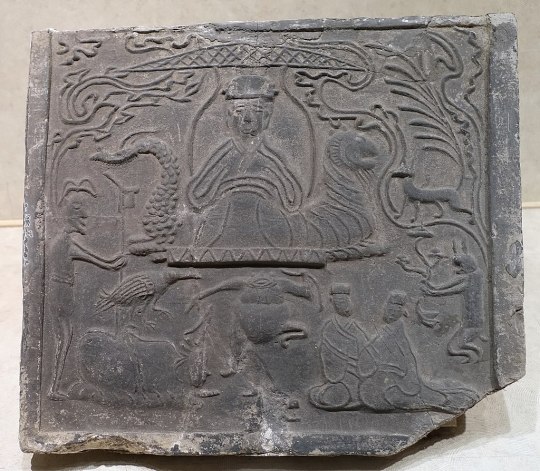
<China Han Dynasty stone-relief showing 西王母/Queen Mother of the West from Sichuan,China>
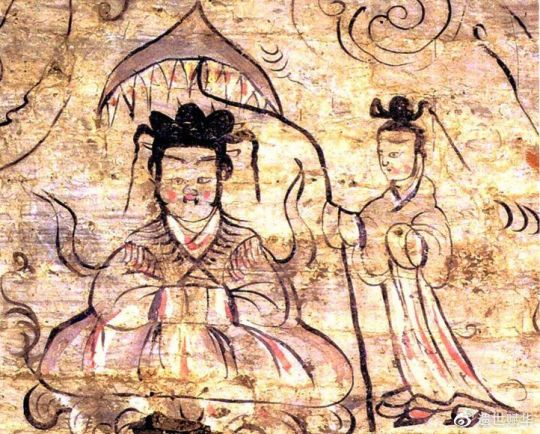
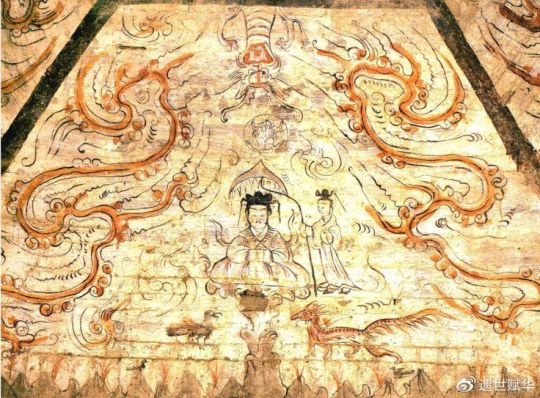
<China Wei and Jin Dynasties Mural showing 西王母/Queen Mother of the West>
————————
📸Photography post-production :@小何力
👗Hanfu & 👑Crown:@雁鸿Aimee
💄 Makeup:百丽 (临溪摄影)
👭Model:@清音音音音
🔗 Weibo:https://weibo.com/1648616372/O2R5bpBud
————————
#chinese hanfu#immortal hanfu#西王母/Queen Mother of the West#Chinese mythology#hanfu#hanfu accessories#hanfu_challenge#chinese traditional clothing#china#chinese#chinese history#china history#漢服#汉服#中華風#小何力#雁鸿Aimee#永乐宫/Yongle Palace
232 notes
·
View notes
Text
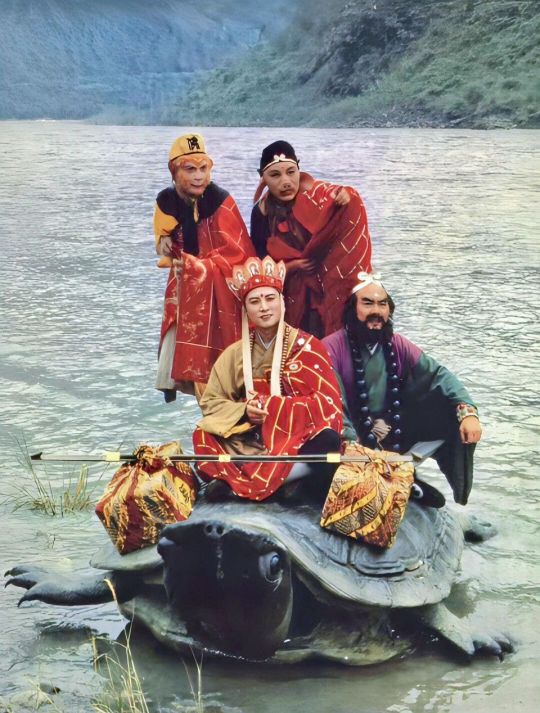
The gang hitch a ride on a friendly turtle.
#Journey to the West#Sun Wukong#Monkey King#Zhu Bajie#Pigsy#Tang Sanzang#Tripitaka#Sha Wujing#Sandy#Chinese mythology#Chinese folklore#turtle
215 notes
·
View notes
Text
Attention Western LMK fans: This is a public service announcement
when someone says “immortal” in the context of Chinese mythology they do NOT mean “can’t die”. They mean “can live forever”
Think of a mortals lifespan as a candle and an immortals lifespan as an infinitely long candle. The immortal candle can burn forever but it someone blows it out it still goes out.
Now some immortal candles are inside a building so they don’t get hit by wind or rain and others are on a patio protected only from rain. It’s different depending on how powerful they are and how many immortalities are stacked
Sun Wukong is an infinitely long trick birthday candle that can blow out in theory but no one’s been strong enough to test that theory
hope this helps clear things up
#lmk#lego monkie kid#lmk sun wukong#jttw#sun wukong#chinese mythology#immortality#ive read to many fics where they say something like “macaque couldn’t have died because he was immortal”#And I just have to take a deep breath and keep reading#I am also from America I just got a Chinese mythology hyperfixation
307 notes
·
View notes
Text
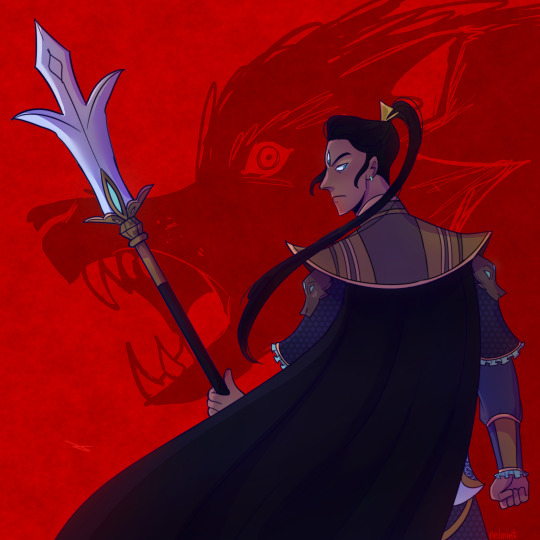
Good evening Erlang Shen enjoyers
#erlang shen#yang jian#lotus lantern#jttw#rel'sart#doodles#chinese mythology#jttw erlang shen#xiyouji#Baolian Deng#explodes him explodes him with my mind#myart
212 notes
·
View notes
Text
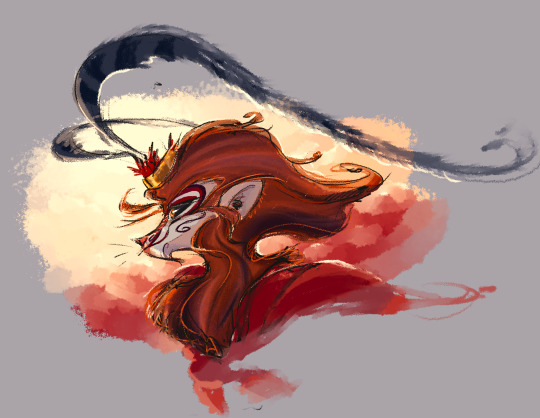

A couple Sun Wukong sketches to cure boredom
#my art#digital art#digital drawing#fan art#sketch#art#drawing#fanart#fantasy#monkey king#sun wukong#journey to the west#jttw#jttw wukong#jttw sun wukong#monkey#chinese mythology#mythology
332 notes
·
View notes
Text
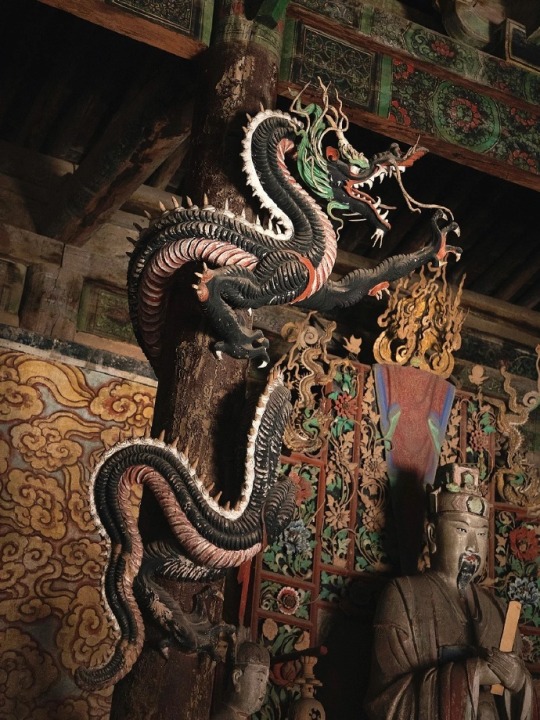
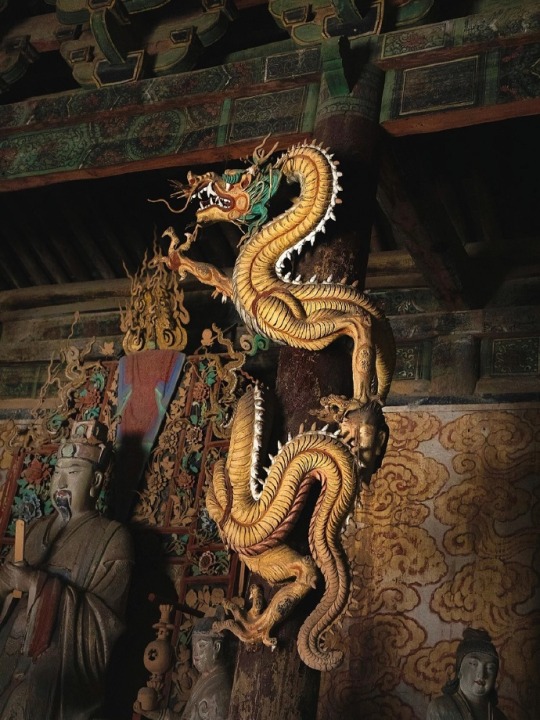
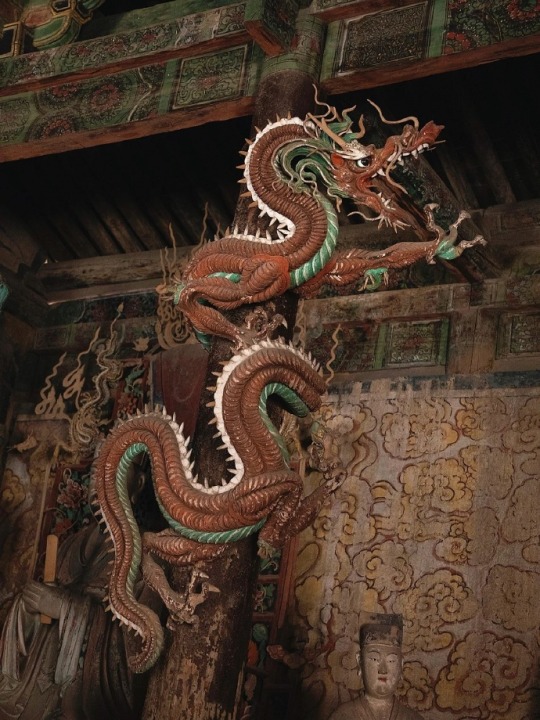
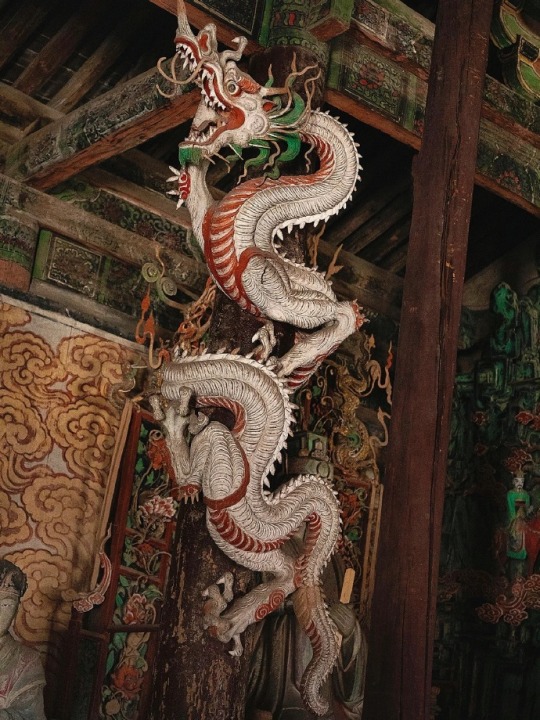

Mythological Realism: Elemental Dragons
Four-color coiled dragons on the pillars of the Supreme Talisman (Taifu) Temple (太符觀).
The dragons are painted in the colors of the primary elements, embodying the archetypal creative forces. In Chinese religious art, almost any concept can be expressed in the language of dragons.) Their children, descendants and relatives frolic on the temple walls among curly clouds.
In view of the striking liveliness, I would classify these images as mythological realism.)
Since its construction in the fifth year of the Jin dynasty (1200), the temple has been repeatedly expanded and supplemented with new buildings over the centuries. Most of the surviving statues are from the Ming dynasty.
The Supreme Talisman Temple is located in Fenyang (汾陽), Shanxi.
Photo: ©故尔耳
#ancient china#chinese culture#chinese art#chinese mythology#ming dynasty#taoist practices#religious art#chinese temple#Taoist temple#taoism#taoist#statue#sculptures#statues#daoism#jin dynasty#dragon#dragons#dragon art#creatures#wood carving#woodworking#temple architecture#wooden architecture#wooden buildings#chinese architecture
379 notes
·
View notes
Text
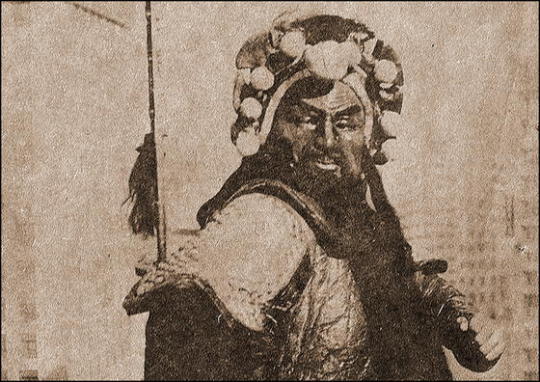


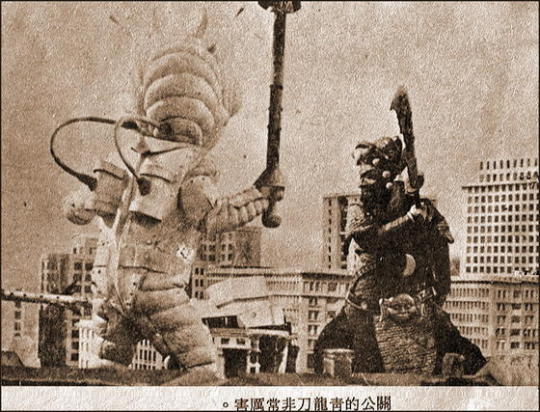
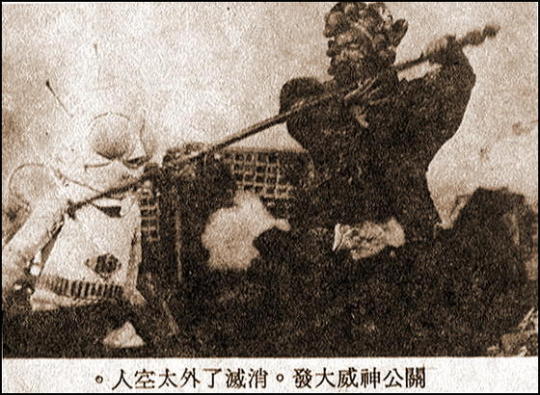
"Zhan Shen" (1976) is a Chinese movie where the war god, Zhan Shan, returns to modern times, and after growing to colossal size, battles enormous Martian invaders.
419 notes
·
View notes
Text
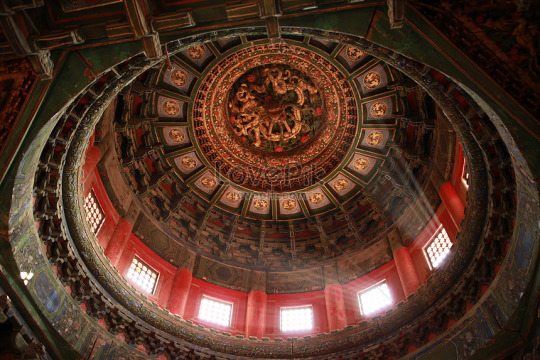
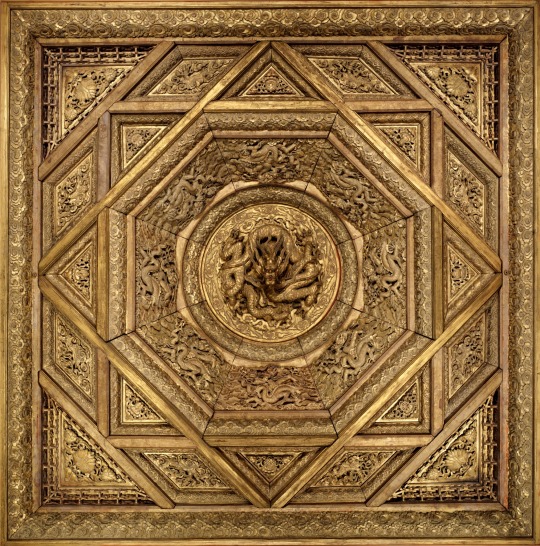
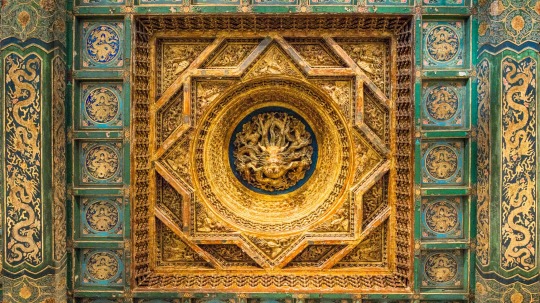

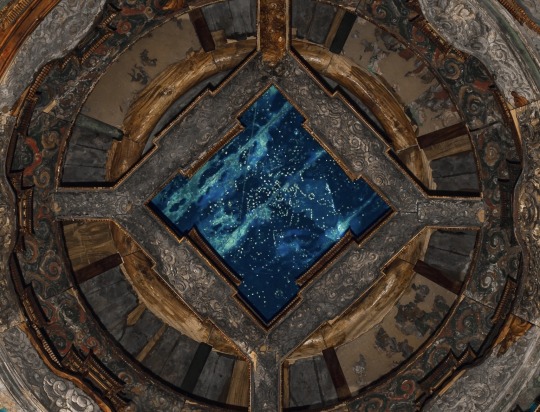
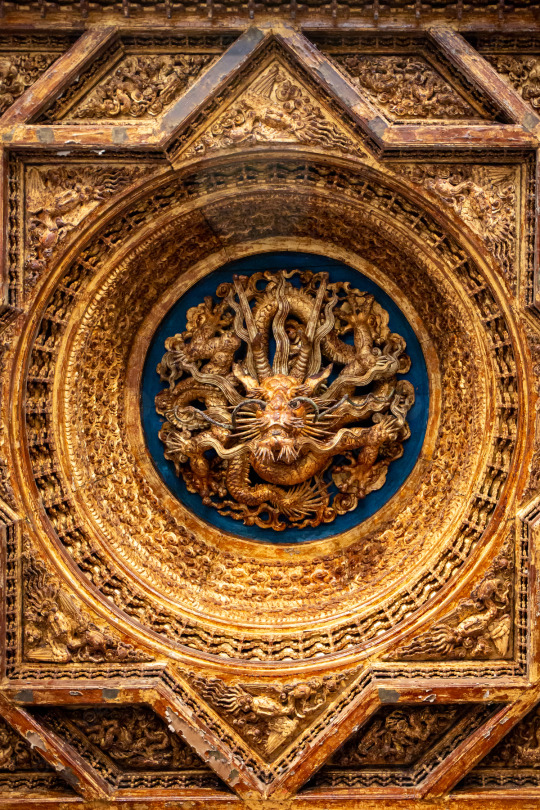
🐉 Caisson Ceilings | 藻井 🐉
A Chinese architectural feature typically found in the ceiling of temples and palaces, usually at the centre and directly above the main throne, seat, or religious figure.
#chinese culture#chinese architecture#asian architecture#asian culture#east asia#China#dragons#ceilings#temples#palaces#chinese mythology#east asian cultures#dynastic china
401 notes
·
View notes